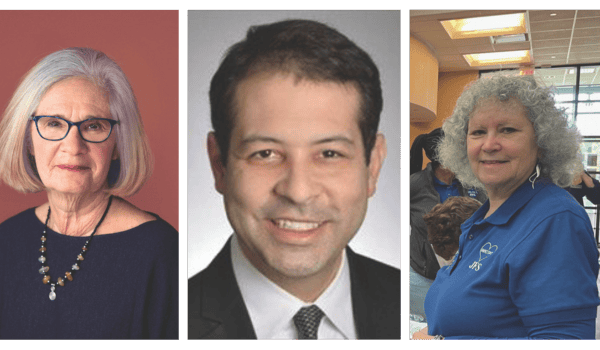As the 2024 calendar year nears the finish line, one pervasive question is: How is it possible to leave behind the stresses and anxieties of the past 12 months and approach 2025 with renewed hope and opportunity? With ongoing wars and hostilities in the Middle East headlining the news each day and an exhausting election season that has left some Americans hopeful and others on edge, the question looms, “On January 1, can we possibly start fresh?”
“The New Year is like a reboot of your computer. It’s a chance to re-set your mind on what you can do and put old stresses behind,” says Debbie Mayer, director of clinical, older adult and adoption services at Jewish Family Service of Tidewater.
Mayer suggests reflecting on the positive aspects of the past year and trying to carry those ideas and memories forward.
Matthew Sachs, MD, MPH, MBA, who practices child, adolescent, and adult psychiatry, encourages preparing for the new year with the Golden Rule in mind. “If we treat others how we want to be treated, watch how many of our problems will disappear. Look at the response you get from someone just by holding the door open for them.” For those who do feel wronged, Sachs suggests striving for the higher road; one day, the other person may see the errors of their ways and return. He promotes adhering to a higher standard. “You will feel proud of yourself, maintaining your moral compass.”
Anxiety and worry create stress that, ideally, can be learned to be better managed in the new year. Louise B. Lubin, Ph.D., a licensed clinical psychologist, recommends reducing the sense of time pressure, a component of daily lives often resulting in a loss of sleep, worrying about how to get it all done. In a blog post, she writes, “Our culture values how much you can do in less time than someone else. Time is money, and status is being too busy.” Lubin refers to this state as hurry sickness. “It can dominate your life, so you have difficulty slowing down even on a vacation.”
Sachs suggests using the holiday season and new year to its fullest. “This has been a very polarizing year, not only in United States politics but in Israel’s fight against terrorism. Not everyone will agree with each other.” However, he sees no reason to excommunicate people over different opinions. “Good friends are hard to find. Family is forever. Losing them over political views would be tragic. It’s time to come back together, to heal any wounds.” The end of the year, he says, is a perfect time to mend any broken relationships.
Setting realistic goals for the new year can help the transition into 2025. Mayer recommends a few, small goals, like starting each day with one positive thought.
Lubin discourages setting goals that are too big, too many, and not specific enough. Instead, she suggests the SMART approach, choosing goals that are Specific, Measurable, Attainable, Relevant and Time bound.
Sachs, who also promotes the SMART method, offers this example:
If a goal is to exercise more often and be more fit:
1) Be specific: pick a number of times to exercise per week;
2) Measurable: be able to see objective progress;
3) Achievable: if running hurts, change to a low impact approach;
4) Relevant: if cholesterol, weight, or blood pressure is high, better health is a perfectly relevant goal;
5) Time allotted: it should be possible to accomplish the feat within the year, so next year a different SMART goal may be chosen.
Focusing on enhanced personal care is another improvement to be made in the new year. Lubin offers some simple recommendations to breathe easier in 2025. She begins with getting to know one’s body clock; paying attention to one’s peak periods during the day, and not trying to do two things at once. Rushing often leads to a poorer result.
Next, Lubin promotes deceleration, finding the discipline to do things more slowly. Eat, walk, and talk more slowly. Take brief times out during the day. When faced with a delay, approach it as found time. Choose to drive in the right lane instead of the left. When it’s not possible to cut back or slow down, vary the rhythm. Always try and take some time out, even for a few minutes. Alternate head and hand work when possible. Change positions often.
Lubin also suggests reducing an awareness of time. Notice how often the phone or watch is being checked and make an effort to reduce those times. Reduce time on the computer and TV and let the cell phone go to voicemail. Consider creating a ritual where time is not acknowledged – just be and not do. For many, that is what the Sabbath is all about.
Consider these tips:
• Pay attention.
• Achieve more by doing less.
• Practice saying “No.”
• Before adding a new activity, subtract an old one.
• Learn to schedule and break tasks into specific steps and prioritize them.
Most achievable goals are moderately demanding, realistic, measurable, and written down.
Try to identify what is really important in the new year, as it will help to plan time in a way that will be better for both mental and physical health.

